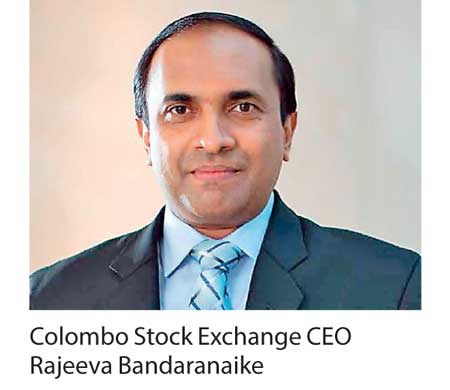Thursday Feb 26, 2026
Thursday Feb 26, 2026
Wednesday, 27 December 2017 00:00 - - {{hitsCtrl.values.hits}}

By Charumini de Silva
The Colombo Stock Exchange (CSE) is in the final stage of getting regulatory approval and rules to launch the SME and Dollar Denominated Boards within the first quarter of next year.
Calling 2017 a turnaround year, CSE Chief Executive Officer Rajeeva Bandaranaike said the decision taken by the CSE Board to set up an alternate market segment comprising additional listing boards apart from the Main Board and Diri Savi Board was a significant development.
He asserted that the multi currency board would facilitate companies incorporated overseas to list their shares while also encouraging local companies to make use of this board to raise debt and equity in foreign currency.
“I believe many unlisted companies would be interested in this as opposed to foreign listings. This board is open to anyone who is permitted to invest using foreign currency. We believe that there will be a lot of interest among foreigners if we get the right companies to list,” he added. Bandaranaike also pointed out that the new Foreign Exchange Act has facilitated this process. In terms of the SME Board he noted that it would allow SME companies to list and provide an exit mechanism for private equity investors in those companies as well as in start-ups.
“We will be looking forward to working in partnership with private equity (PE) companies to develop this board and offer a supporting role. We are keen to complete the value chain from a start-up through a PE firm, to migrate to the SME Board, to the Diri Savi Board and finally to the Main Board or Multi Currency Board listing,” he stressed. After many changes and deliberations over the past few years, he said they were able to reach a consensus with the regulator and the CSE Board to commence procurement of the necessary system upgrades for the Delivery vs. Payment System.
“It is likely that we will implement this in 2018. A few loose ends like the margining methodology have to be finalised with the regulator and then rolled out to the market intermediaries,” he added.
Bandaranaike pointed out that the rebranding of the CDS as a more commercially-focused depository was a significant development in 2017.
“As a depository we have now moved from being a plain vanilla depositary to a more commercially-focused depositary, which launched its new corporate action and registrar services for listed and unlisted companies,” he emphasised.
In parallel, he said the depository also launched the digitisation project which will bring enhanced services to stakeholders by providing stockbrokers with the ability to open CDS accounts instantly without having to send documents to the CDS.
“Once regulatory approvals are obtained, we will be looking forward to launch this in early 2018,” Bandaranaike added.
He outlined the Broker Back Office (BBO) and Order Management Systems (OMS) as key highlights implemented this year.
“This is the first of such a market-wide upgrade of broker infrastructure took place. The brokers now possess better risk management capabilities at their end, which provides them better control of the trading system and the ability to customise and differentiate their product offerings to their clients.”